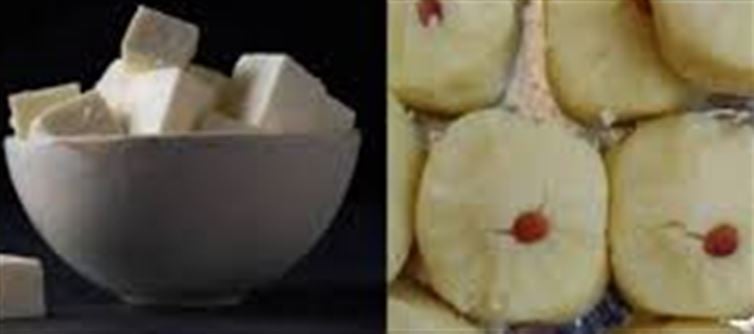
As the festive season of Diwali draws near, the markets are bustling with an array of sweets and snacks. Among these, paneer and khoya are essential ingredients in many traditional sweets like kaju katli, burfi, rasgulla, and gulab jamun. However, while indulging in these delicious treats, there's a hidden risk you need to be aware of—adulterated paneer and khoya. This health hazard could turn your festive celebrations into a nightmare. Here's everything you need to know.
1. What Makes Paneer and Khoya So Vulnerable to Adulteration?
Both paneer and khoya are made using milk—a natural product that, if improperly handled, can easily be tampered with. These dairy products are extremely popular during diwali, making them prime targets for adulteration. Some common methods of adulterating these foods include:
· Using harmful chemicals like washing powder or detergents to enhance the texture of paneer.
· Adding starch, washing soda, or soap to khoya to increase the volume and reduce production costs.
· Mixing in non-edible substances like plastic pellets, which mimic the look and texture of real paneer.
2. health Risks of Adulterated Paneer and Khoya
While the adulteration of these foods may not be immediately obvious, consuming contaminated paneer or khoya can lead to several serious health issues:
a. Digestive Issues
· Detergents, soap, and starch used in adulterated products are not meant for human consumption. Eating them can lead to severe gastrointestinal problems like vomiting, diarrhea, and stomach cramps.
b. Chemical Poisoning
· Washing soda or non-food-grade chemicals may cause toxic reactions, leading to nausea, headaches, and in some cases, organ damage if consumed in large quantities.
c. Long-Term health Impact
· Repeated consumption of food laced with harmful substances could affect the liver, kidneys, and digestive system over time, leading to chronic illnesses.
3. How to Spot Adulterated Paneer and Khoya?
You don’t always need sophisticated tools to detect adulteration. Here are some quick checks you can do at home:
For Paneer:
· Texture: Pure paneer should feel soft and spongy. If it feels rubbery or unusually hard, it could be adulterated.
· Smell: Fresh paneer has a mild dairy aroma. If it smells sour or has a chemical scent, avoid it.
· Water Test: Place a small cube of paneer in water. Pure paneer will not dissolve. If the cube dissolves or changes shape, it indicates the presence of adulterants.
For Khoya:
· Color: Authentic khoya is creamy white or slightly off-white in color. If the khoya has a pale yellow or unnatural bright white color, it’s a red flag.
· Taste Test: Take a small piece and taste it. If it has a soapy or chemical aftertaste, it’s adulterated.
· Texture: Real khoya is grainy and soft. If it feels sticky or unnaturally smooth, it may have been tampered with.
4. Where to Buy Safe Paneer and Khoya?
To ensure the safety of what you're buying, always opt for reputed brands or local dairy shops that you trust. Here are a few tips:
· Choose certified brands: Look for paneer and khoya that come with proper labeling and certifications from FSSAI (Food Safety and Standards Authority of India).
· Buy fresh: Adulterants are often added to preserve products for longer periods. Always purchase fresh paneer or khoya instead of pre-packaged ones that have been sitting on shelves for too long.
· Trust local dairies: If you have a reliable local dairy, they may sell fresh, unadulterated products. Ensure their hygiene standards are up to mark.
5. How to Safeguard Your health During the Festivities?
While diwali is a time for indulgence, it’s important to prioritize your health and safety. Here are some simple steps to stay safe:
· Buy from trusted sources: Ensure that you are buying paneer and khoya from established, certified vendors or well-known brands.
· Check labels carefully: Always look for FSSAI certification and expiry dates when purchasing dairy products.
· Use homemade ingredients: If you're making sweets at home, make your own paneer and khoya to avoid the risks associated with buying them.
· Stay informed: Keep yourself updated about the latest adulteration techniques and trends in the market to better protect yourself.
6. Conclusion: A Healthy Diwali
Diwali is a time to celebrate joy, but it’s important to remember that food safety should always be a priority. With the rise of adulterated paneer and khoya, it’s crucial to stay cautious and take steps to protect your health. Whether it’s by buying from trusted sources or making your own dairy products, ensure that the sweets and snacks you enjoy are not only delicious but also safe.
Celebrate responsibly and have a healthy, happy Diwali! 🌟🪔
Disclaimer:
The views and opinions expressed in this article are those of the author and do not necessarily reflect the official policy or position of any agency, organization, employer, or company. All information provided is for general informational purposes only. While every effort has been made to ensure accuracy, we make no representations or warranties of any kind, express or implied, about the completeness, reliability, or suitability of the information contained herein. Readers are advised to verify facts and seek professional advice where necessary. Any reliance placed on such information is strictly at the reader’s own risk.




 click and follow Indiaherald WhatsApp channel
click and follow Indiaherald WhatsApp channel